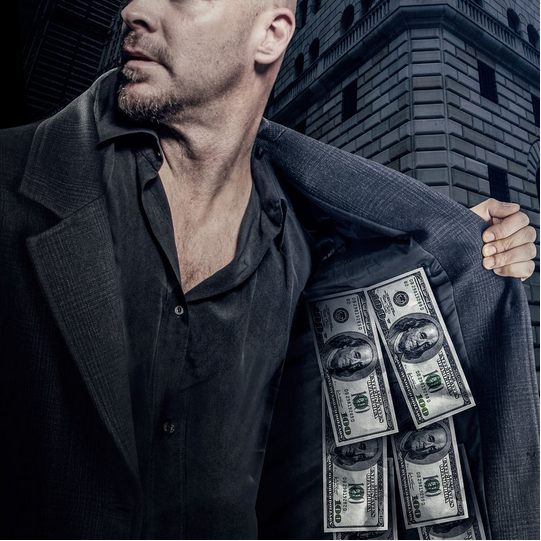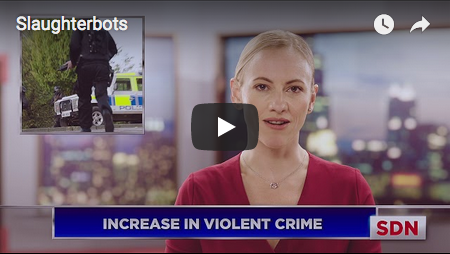The assertion from the article (link), is that ‘Almost 80% of the cash circulating outside financial institutions is in $100 bills’ and by removing lager bills… it would be making it harder for bad guys to transport all their “earnings.” Agreed. But it’s just another bandage, especially with half of them outside America’s boundaries. Obviously, transport hasn’t been that big of an issue.
This is a vital conversation to the members within the Investigative and security community at almost every level, so let us know what you think and make your opinion and your experiences heard.
As it clearly points out within this article and as any “regular person” in society already knows, there are substitutes for cash in these “high-level financial interactions” – including but not limited to cryptocurrencies, uncut diamonds, gold coins & bars, and prepaid cards. But we are not talking about the small interactions occurring every second around the corner, in your town. They matter, but they are nothing in the bigger picture. We are talking huge amounts of money exchanging hands for something much, much bigger.
As we now advance into 2018, and as it relates to cryptocurrencies, my personal opinion remains unchanged. Block-chain and the use of cryptocurrencies will become the best option we have to track any and all financial transactions, as long as the management of these currencies stay out of the hands of Governments and Corporations. But will it? Not just that, but will the final accepted global currency be allowed to be “open” and not controlled by the most powerful Nation State(s)? Only time will tell.
The caveat here is that the transition to a blockchain secured monetary system will take a significant time to adapt. Why may you ask? Besides the reluctance of the general population to adopt something that they don’t yet fully understand, the polarization tactics used by interested parties to question its validity, and all paper and coin fiat money on the planet will need to be slowly removed from circulation so standards of exchange can be formalized globally.
The fact remains that no one wants to lose the power associated with monetary control, especially America, the American politicians or American citizens. The simple truth that it is the Dollar and the belief in the Dollar’s value that gives control and that control keeps us in power, over others and of ourselves. If we have a universal currency, everyone becomes equal and while in theory, it is good, no one will vote for it for the simple reason stated above. I for one am watching to see how it plays out with bated breath.
There is no doubt that cash is still king in illicit activities, and anyone who has worked undercover in the governmental, state, local or private sector knows this fact well. Everyone has seen the media’s attention on television, online or the agencies Facebook page, LinkedIn page and tweets when drug bust seizures make the headlines. Cash and substitutes of value do exactly what they need to do… they deliver absolute anonymity, portability, liquidity, and dare I say near-universal acceptance. To state publically that Pablo Escobar’s cash problems were different then most of ours is an understatement.
On universal acceptance: It’s amusing how terrorist organizations like ISIS, condemn America and it’s Capitalist policies, but it doesn’t burn US Currency (Dollars) when they reportedly find US Dollars stockpiled somewhere in the Middle East and take it as their own. Do they make a PR or recruiting video showing the cash being burnt in defiance like they do with the American Flag? Nope. The money is gathered gently, stacked cleanly and used freely (like any other Red Blooded Capitalist), to forward their ideals, ideas, propaganda and business interests…unless we find it again, bomb it with a drone airstrike and claim victory in the media for depleting their funds. Even Pablo Escobar reportedly used it to become a Governmental official in Columbia.
It’s silly to think that eliminating the Hundred Dollar Bill from the currency is the best chance we have as a society to combat corruption, terrorism, tax evasion, illegal immigration, racketeering, extortion, money laundering, drug and human trafficking, the corruption of public officials and terrorism. With that said, removing the largest denominations from circulation would have the desired effect here, and I do agree that is tactic would make transport, storage, exchange and laundering more cumbersome. But the adaption is just wasting time if our intent is to rid America or our global community of these plagues.
With that said, the larger issue remains. If we take all the problems and try to correct them simultaneously with the resources we have, even with increasing tax revenue, we are going to get what we have always gotten: a continuation. Might I be so bold as to suggest starting with one? How about investing it first in exposing it, publicizing the parties involved with the evidence obtained, and imposing extremely harsh penalties… including for perpetrators in roles of civic responsibility? Good old fashioned Investigative Journalism? Homeland Security Begins at Home. Do I need to say it again? No, if you’re still reading, you know it already.
The border wall is the best analogy to highlight the problem, causing the reaction hamster wheel we are stuck in. Following large issues like this will show how the issues are polarized, how suggestions remain “tabled,” and the use of propaganda in all its glory keeps the issue at the forefront, or just beneath the surface. Divided we fall, and if we don’t get our act together, we just might be there sooner than you think.
Think of how Nancy Regan’s War on Drugs campaign from October 1982 worked out, or the war on poverty from President Lyndon B. Johnson starting in 1964, the gun control war that actually started the American Revolution or any of the other hot-button issues that have received any significant airtime in the past few decades. The problem isn’t with the issues, as they are honestly the concerns, issues, and problems that impact or plague our society. There is right and wrong, but in our current structure, there is never a middle ground – outside of our own homes, dinners, groups or circles. You just can’t trust your opinion will be manipulated, taken out of context or used as propaganda by a well-oiled machine. Yet, we remain in discussions, going around and around on a road to nowhere.
Why can’t we start by taking a consensus of the top 20 issues facing us today using all eligible American voters? Why can’t we use the result of that vote as not only a starting point but to confirm our chosen representatives in local, regional and national office be held to the actual desires of the constituency? Mandate their vote on every issue and allow for a limited written discourse of no more than 5,000 words? Adjust the needed by scaling up or scale down moving forward, by the vote of the constituency. What remains for us to accomplish this? Faith that not only our vote is being accurately assessed and counted, but that our elected officials will not be convinced to portray our votes other than they are and for special interests to be removed in their entirety from the political process. Will we be able to accomplish that? I truly hope so, because that is the only way for it to be done.
What gets attention in the talking points is not always what is popular. The problem is with the area between the identification of the problem, the decision that something needs to be done and the full execution. The phrase “Too many Chiefs, not enough Indians” comes to mind, or for you politically correct folks that find problems with everything types: “Too many managers not enough people to do the work.”
Politicians and political parties, in general, are very similar when coming to an agreement on these issues. It’s like playing old-fashioned pinball; noises, lights, and excitement while points are being scored, then when the paddles miss or you go into an area that is restricted, the games over and our short attention span hears another game beeping and dazzling with lights and you move on to that one. Don’t worry though; all of our problems are set up to play again after you insert some money (think: donation or taxes) or you and your friends get together to share a blog and it gets traction with the media to fill airtime and push an agenda. In the Investigative profession were we not taught to “follow the money?”
But, where there is a will, there is a way.
As with any other problem, there are always other solutions. Businesses, legitimate or illegitimate, surface to facilitate the demand. If our intent is to actually make a BIG DIFFERENCE and to stop this from being a Governmental sized game of whack-a-mole – that we have no chance of containing because we are reactive and always behind – we need some HUGE sweeping changes and the powers that want the status quo to remain the same (because of profit, influence or power) will not like it one bit. It’s obvious in the election promises, speeches, and tweets of our current President Donald Trump. America’s majority wants change, they want transparency, they want unification, they want freedom, and they want what has always been the promise – the American dream. Which is not the intent of this well-written article. This friends, is for informational purposes only, sent to a very specific type of reader. Ask yourself the question… was it you that was the intended audience? If your watching, expect the parties with the most to lose to employ all the common tactics, fighting it all the way using spin, manipulation, diversion, accusations, false and misleading statements and even murder.
The author’s target market might be actually addressed in the third paragraph, as it relates to his specific area of expertise and career history. This is in no way to imply that I do not respect Dr. Rogoff or appreciate the wonderful article presented. In fact, we have not personally met. All I can ascertain is what is presented and the results from the preliminary and cursory review performed on his career and the institutions he is associated. These are simply responses using personal experiences and observations from within my own career.
As for the topic being discussed, I draw on the stated positions and examples provided and continue to use the follow the money approach to better understand and ascertain the true nature of the position being taken and who and how it impacts. As an example, he writes, “Cash is also deeply implicated in tax evasion, which costs the federal government some $500 billion a year in revenue.” How does revenue fit in here? Is IRS revenue first on our list when it comes to Law Enforcement agencies ability to rid our communities of issues like racketeering, extortion, money laundering, drug and human trafficking, the corruption of public official’s and terrorism? Then I remember what I have previously come to understand and start to piece it together for myself.
Dr. Kenneth Rohoff is a Professor of Public Policy at Harvard University, the former chief economist of the International Monetary Fund (2001-2003), a senior fellow at the Council on Foreign Relations, and serves on the Economic Advisory Panel of the New Your Federal Reserve.
His article goes on to state that; “though the data are much thinner for state and local governments, they too surely lose big-time from tax evasion, perhaps as much as $200 billion a year.” While we the general reader or American citizen is not the target market of his writings or of his life’s work, the credibility of publications like the WSJ provides the distribution network and citations for future validation.
As an educated consumer and citizen, you can assess for yourself who Dr. Rogoff is with a better understanding of how his work is associated with society at large. As with any topic addressed, investigate yourself the parties involved, and how each of those entities fit within the larger puzzle. It is only then that you can formulate an option. Read the entire article and judge for yourself. Don’t rely on anyone else’s stance or opinion, even if it seems factual or quotes any kind of study. I can only suggest signing up for a subscription to the Wall Street Journal and following the writings of topics that not only interest you but also have an impact on the society you and the generations that follow you reside.
Original article can be found here.


